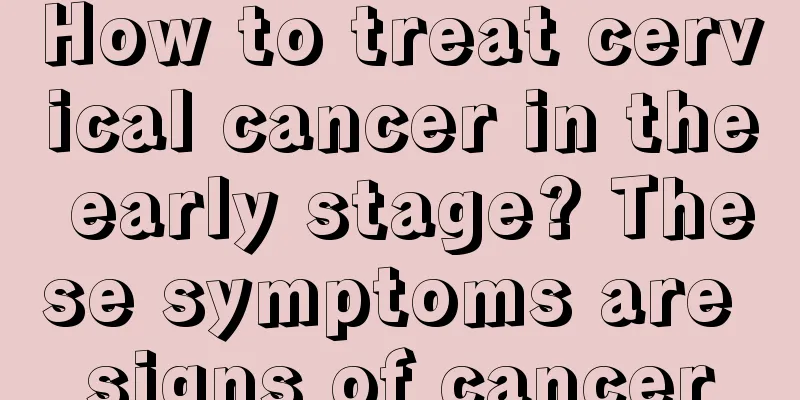How to treat cervical cancer in the early stage? These symptoms are signs of cancer

|
Women over 40 who have vaginal bleeding outside of their menstrual period or who have reached menopause should be alert to the possibility of cervical cancer or endometrial pain. Let's take a look at the early symptoms of cervical cancer. What are the early symptoms of cervical cancer? Irregular vaginal bleeding Vaginal bleeding accounts for 81.4% of cervical cancer patients. Bleeding usually occurs after sexual intercourse or defecation. Some people bleed after sports activities or gynecological examinations and have irregular menstruation. In the early stages, the amount of bleeding is small and can often stop on its own. In the late stages, the cancer invades large blood vessels or because the cancer itself is rich in blood vessels, heavy bleeding may occur. Long-term chronic bleeding or acute bleeding can cause anemia in patients. Therefore, women should be vigilant if they have vaginal bleeding many years after menopause. pain This is one of the common symptoms of advanced cervical cancer. Cancer compresses the pelvic nerves, causing pain in the lower abdomen, lower back, or thighs. If the cancer invades the rectum, poor bowel movements and anal swelling may occur. If it compresses the bladder, frequent urination, urgency, pain, and hematuria may occur. Contact bleeding After sexual intercourse or constipation, vaginal discharge (leucorrhea) mixed with blood, sometimes in a stringy, sometimes dark red color. Women over 30 years old, who have given birth, and who live together as a couple, should be considered an early sign of cervical cancer if they suddenly have vaginal spotting after sexual intercourse. With cervical erosion Generally speaking, most cervical cancer patients are accompanied by cervical erosion, and severe cervical erosion is the main cause of cancer. Young women with cervical erosion that has not been treated for a long time, or cervical erosion after menopause, should be given enough attention. Psychological treatment for patients with cervical cancer Relieving patients' concerns Young cervical cancer patients are worried about the loss or change of their feminine characteristics, sexual function, and fertility after treatment, and they are worried about being despised and abandoned by their husbands, friends, and society. They are afraid of losing their jobs and status and losing their financial resources due to the disease. This should be noted in the psychological care of cervical cancer. In response to the psychological problems of patients, psychological care of cervical cancer uses appropriate and concise language to describe postoperative rehabilitation and married life, and the significance of preserving ovarian metastasis. Encourage patients to establish a belief in survival Ancient medical books say: "If the spirit is weak and the will is not cured, there is no cure." We should encourage patients to fight the disease with a firm belief in cure. Medical staff treat patients sincerely, infect patients with words and art, warm their hearts, and enhance patients' belief in survival. Let patients realize that only by tenaciously fighting cancer, believing in modern medicine, and actively cooperating with treatment can they survive. |
<<: Early diagnosis method of cervical cancer How to treat early cervical cancer
Recommend
How to get pregnant with irregular menstruation
With the improvement of living standards, people&...
What are the methods to prevent static electricity in winter?
I believe that in daily life, many friends will h...
Could armpit pain be breast cancer?
This position of the armpit is usually the tail o...
Can I eat black pepper if I have gastritis?
Long-term unhealthy and unscientific diet will le...
Does ovulation pain occur during ovulation?
Generally speaking, women will not experience obv...
How to prevent ovarian tumors in daily life
In today's society, women have been liberated...
What tests are needed to diagnose lung cancer? These tests must be done to rule out lung cancer
Lung cancer is a serious respiratory disease. Man...
Herpes symptoms and diagnostic basis must be read
Herpes is a skin disease caused by herpes virus i...
Analysis of the treatment methods of skin cancer: surgical treatment
There are many methods for treating skin cancer c...
What are the folk remedies for lung cancer that have the effect of removing blood stasis and dispersing nodules?
The so-called "dispersing blood stasis"...
How are acute brain tumors treated?
Patients with acute brain tumors will show sympto...
The hazards of premature infant milk powder
For newborns, since the digestive system is not y...
Why do men have urgency, frequent urination and inability to urinate completely?
Some people in life will have the phenomenon of f...
The impact of chest X-ray on the fetus
Speaking of chest X-ray, I believe you must know ...
How to relieve vomiting after chemotherapy
Many patients will experience vomiting after chem...









